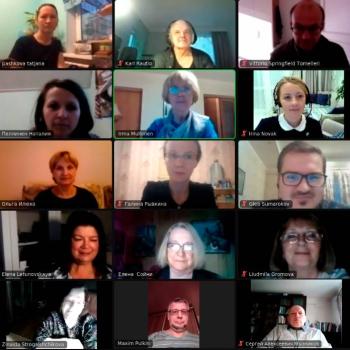My dad lied to my grandma a couple of years ago at a family gathering. He and I had been walking around his land and having the conversation I'd been longing to have with him all Thanksgiving, and when we went back into the house, she asked us if we'd been on a run—my dad is still an avid runner, although I am not.
"Twelve miles," he told her. "Good brisk pace."
"You're lying to your own mother," I said to my dad. "Shame." And then I turned to her. It's fun to stir up trouble between them. "He's lying," I said to her.
"You don't want to lie," she said to him. "Liars will have their portion in the Lake of Fire."
Which is, I guess, where my father and I are both going to end up if my grandma is right about God, the Bible, and everything, since I have been lying to her for most of the past thirty-five years.
I love my dad's mother, Irene, who is, honestly, one of the most faithful Christians I know, and who has prayed for me every day of my life, and who loves me, as I love her, devotedly and doggedly. She lives in western Oklahoma, where the wind does come sweeping down the plain, and she has been a member of Clinton First Assembly of God Church since 1948. For most of those years she played piano or organ, but since she's now 92, I suppose she's entitled to step back from a thing or two.
I have encountered many of the more difficult and most repressive tenets of Christianity in the Assembly of God tradition. My parents actually compromised on the Southern Baptist Church as a way of averaging the Pentecostalism and Methodism of their parents, and since growing up in the Southern Baptist tradition nearly killed me, I can hardly imagine life in the Assemblies of God, except as I see Grandma live it out. It revolves around prayer, and gifts of the Spirit like speaking in tongues, healing, and prophecy, and around an unshakeable certainty that God has set up through his infallible Scriptures (the King James Authorized Version, naturally) an absolute set of standards to which one must adhere in order to escape eternal hellfire.
This is not how I understand faith and practice and the Bible, which I suppose I could explain to her. We could have a debate. She could cite chapter and verse; I could talk about the larger biblical narratives of grace, forgiveness, and commitment.
But she is over 90 years old, and she is never going to change her mind about anything she believes.
And so I lie to her.
I lied to her during the years when I was in the wilderness, although I felt less guilty about it then. When she asked if I was in church, I told her yes, every Sunday; when she asked if I was reading my Bible, I told her yes, every day. This has become the unofficial policy of my family; to avoid hours of preaching, a two-second lie to Grandma is not a bad thing.
I suppose I thought—naively, it now seems to me—that I could stop lying to her about religion after going to seminary, becoming a preacher, living a faithful life. She is, she says, proud of me, and I do believe it.
But my way of belief is not her way, and she has never quite understood how anyone she loves could fail to find the Assembly of God a natural home. When I told her I felt called to go to seminary (something Assembly of God preachers do not generally do; there is only one accredited Assembly of God seminary in the U.S., and most of their preachers seem to be proudly unlettered), she sat me down and asked a question that had been troubling her. "Do Episcopals believe in Jesus?"
Now, as an Episcopalian who feels that his life as well as his soul have been saved by belief in a loving Son of God, my options were wounded outrage or sly humor.
As always, I chose humor.
"No," I told her, without a hint of a smile, and watched the horror spread across her face. "We worship Satan."
It was just a split-second of belief before she realized I was pulling her leg, but it was enough.
And this is how we've gotten along my whole adult life. I have told her what she wanted to hear, even if I didn't believe it, or I have made a joke and tried to get her to talk about something besides Jesus.
Good luck with that, by the way.
But I knew it was going to be a difficult Thanksgiving when (in the story I tell at the beginning of Faithful Citizenship), ten seconds after I had entered my father's house, said my hellos, and parked myself at the table where everyone was already eating, my grandma started asking me to enthuse about Sarah Palin.
Now whatever you think about the woman, it doesn't take much awareness to know she's one of the most polarizing figures in American life today; some people love her, and others loathe her, and why on earth would you lead off a conversation at Thanksgiving with that?





